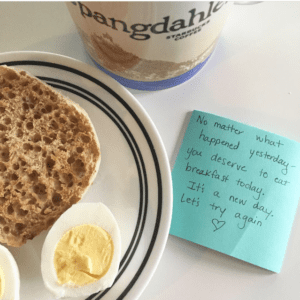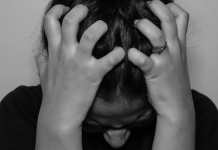By now, you’ve probably seen countless articles on how the new trend of intermittent fasting is helping people lose weight quickly with only small changes to diet. By committing to eat all of your meals during a 6-8 hour window each day, and fast the remaining time, you’re able to drop your caloric intake all while allowing your body the time it needs to fully recover and empty your stomach and intestines.
It’s natural, no extra shakes or vitamins needed, no tracking calories, and yields flatter tummies in record time- goodbye bloating! After maintaining a 40 lb weight loss using WW for the last year and a half, I decided that mixing it up with intermittent fasting (IF for short) might be just the thing I needed to lose the last 5 pounds I wanted to drop. After all, I already had a balanced diet in place, as well as portion control, and regular exercise had become my norm. Maybe just limiting my eating window would surprise my metabolism and kick it back into gear. What happened next was definitely surprising, but not in the, “Welcome back my old friend- size 8 jeans!!” sort of way. Noooooo.
 Instead, the thing I welcomed back was a nasty relapse of Binge Eating Disorder.
Instead, the thing I welcomed back was a nasty relapse of Binge Eating Disorder.
I was caught off guard. In all of the articles on IF I had read, not once was this touched on as a possible outcome. The term binge eating has started becoming common in our regular vernacular – binge-watching Netflix, for example. Everyone occasionally attends a party that has that one dish that they just can’t say no to, and winds up overindulging – maybe you “binged” on that delicious buffalo chicken cream cheese dip at the work Christmas party. Or you pick up a dessert that just tastes so good that a second or third piece of cake ends up being eaten when one really would have done the job.
However, true Binge Eating Disorder (BED) is a compulsion to eat ALLLLL of the food on a regular basis. It includes a feeling that you have no control; a need to finish the entire container of ice cream despite the fact that you already feel so sick, despite the fact that you are aware that you don’t actually want the ice cream at all, and despite the fact that you already are ashamed of how much you have eaten. It’s a cycle that I was finally able to break mostly free from in January of 2016, thanks to support from others suffering from BED and using WW to retrain my brain how to enjoy a reasonable amount of food without feeling restricted. And that last part is what is so triggering to me about intermittent fasting – restriction.
On the first two days of trying IF, I admittedly felt really good. I stuck to less restrictive 8/16 schedule (many IF use a 6/18 schedule), where we would have dinner finished by 6pm and then fast for 16 hours, not consuming anything with calories until 10 am the following morning. It was relatively easy to just tell myself that I was done eating at 6pm instead of debating with myself over whether I actually wanted dessert or not. And, my stomach did indeed feel less bloated when I woke up. I didn’t feel truly hungry until that 10 am hour loomed, and being able to sense those true hunger pains and see that they are sensationally different than routine hunger was a helpful practice. But then came day 3.
As usual, I ate my breakfast at 10, but I was hungry. No, I was HANGRY. Breakfast didn’t cut it, I needed something bigger, and in my mind, since I was waiting until so late to eat anyway, why not just make it lunch? So I continued to munch. By early afternoon, I was craving the dessert that I was no longer “allowed” to eat in the evening once the kids were in bed because it was past my 6 pm cut off, so I snacked on candy while the kids did their quiet rest time. And then… I just kept eating.
I had to get in all of the food I wanted to enjoy before the clock expired at 6. So I ate as quickly as I could as if the food would actually disappear.
I dutifully quit eating at 6, my stomach distended and a sugar headache pounding on my brain, wondering if maybe stretching my fast an extra couple of hours until noon the next day would help undo the damage. So I did that, only when noon hit, I skipped the healthful breakfast food I normally eat and picked up a large fast food meal, complete with a milkshake. I continued scavenging the pantry that afternoon, and it wasn’t until my kids were winding around my feet begging for dinner at 6 pm that I realized that it hadn’t occurred to me to actually make dinner and feed my babies because I was in a full blown binge eating cycle. Let that sink in.
My kids were not being fed because I was so focused on eating everything I wanted before I began my fasting for the night.
I decided right then and there that IF was not a good fit for me.

I was so embarrassed that something as “easy” as intermittent fasting wasn’t workable for me. How could I fail at simply not eating at certain times? But the more I reflected on it, the more I realized how this plan could be hard on anyone struggling with disordered eating in some form. At the heart of intermittent fasting is restricted eating – a shared bond with most eating disorders. I’d like to say that I was able to easily pull myself together, but that’s not the case. As anyone who has struggled with an eating disorder knows, when you have a relapse, it takes time to regain control of your mind.
I had to relearn things that less than a week ago had been second nature. Isn’t that odd? In my four days of trying intermittent fasting, I was able to undo more than a year of hard work. I had to remind myself that I deserved and needed to eat breakfast no matter how much I had eaten the day before. I had to go back to planning my whole day of food on my meal tracker, making sure I ate foods that I wanted so I didn’t feel restricted. I left room in my life for the treat of a favorite dessert on the couch with a trashy tv show once the kids were in bed. And gradually the eating compulsions subsided. My right mind returned, and the ability to reason with myself when I’m faced with scooping ice cream for my kids at bedtime; the freezer will still contain that same ice cream tomorrow if I really want it.
It took me two months to fully right myself, and yet, when I see another article touting the benefits of intermittent fasting, I read it and consider trying it again for a half-second. It really does sound like a solid plan. However, deep down I know that the promise of losing these last 5 pounds of belly fat I haven’t been able to shake could never measure up to the mental well being I’ve finally been able to find for myself.














Thank you so much for this post! This is a wake up call that may have saved me from relapsing to a full-blown BED. I lost 80 lbs 9 years ago in 7 months by cutting calories and restricting, resulting in a BED that lasted for 3 years. The recovery from BED meant that I could not restrict anything for years, resulting in weight gain again, I have been successfully in the process of losing fat again, this time with a keto diet. It has proven to be a good way of eating for me, having 3 solid meals a day without feelings of deprivation or hangryness, 48 lbs lost since Sept.
But now I had a major operation this week, and decided to intermittent fast for 24 hours due to my mouth being sore. So I did just that. Then yesterday, after having fasted for those 24 hours, I broke the fast and since then have had constant feelings of deprivation, elevated hunger, sugar cravings and a really pressing need to BINGE.
And that somehow led me to start thinking of IF’ing today also, and the for a whole month of 8:16.
After reading your post, I now see clearly that I’m seriously in the danger zone with these thoughts! I immediately made myself breakfast and will keep on eating my solid, healthy lo-carb 3 meals and snack if I feel like it. Had I not read this post right now, I would most propably have fallen into the vortex of dangerous binge eating again, which would have taken me again years to recover from.
LuLu- I can’t tell you how much waking up and reading your response meant to me! BED is such a strange topic; it isn’t something everyone battles (thank goodness!!) and for those of us who do, it can feel unrelatable. I’m so sorry to hear those sneaky thoughts have been creeping in for you, and I’m so SO glad you were able to see them before they got the better of you. Clearly IF is an eating strategy that works for some people, but for those of us fighting an eating disorder, restricting ourselves always leads to a dangerous bounce back. And- a BIG congratulations on finding a healthy eating plan that works for YOU! Stick with it, you know it works, even if it takes a couple of weeks to get your mind around it again. Go back to basics, and I hope your mind and body heal quickly ~~Katie
Thank you for this article. I decided to try out Intermittent fasting for the health benefits it is linked to (I have many gut issues). The first two days, my stomach was much less bloated, so that aspect did work, but I have a history of Anorexia and Bulimia 🙈 I’ve been recovered for 5 years, so I thought as long as I get the right amount of food into the window, I should be fine, but that empty stomach feeling triggered the body dysmorphia, as well as triggering the binge eating.
So I can safely say if someone has a history of an eating disorder, intermittent fasting is not a great idea… It is possible to try stick the minimum fasting period of 12-13hours (overnight), just to rest the gut, but I wouldn’t go beyond that. ❤️
Finally, I find someone with exactly the same story as mine !!! I was happily and successfully following keto for a year till the IF bug caught up with me…It started great, 3 days and I lost 3 very stubborn pounds and then 4th day it started…binge eating and puking…I dont really have a bulimic history, just maybe a few times in the past I might have thrown up after binge eating, so I was surprised, but nevertheless continued with my IF (with the widely used “we are humans and we make mistakes, forgive yourself and move on”). Next 2 days were fine, but the 3rd day again major binge eating and puking. 4th day again the same thing ! but ofcourse I continued with IF !!!!! ….next one day was somehow ok…but the day after, I got into serious binge eating !!! and this continued.
After 12 days of IF, I had put on 6 extra pounds, felt terrible…and the worst was exactly like Katie – I negelected my kids !!! was only thinking of what to eat next all the time….. I gave it up, took a few days to come back on my original lifestyle and swore never to try IF again
I really wish somehow this global hysteric promotion of IF also highlights this devastating side effect !
Comments are closed.